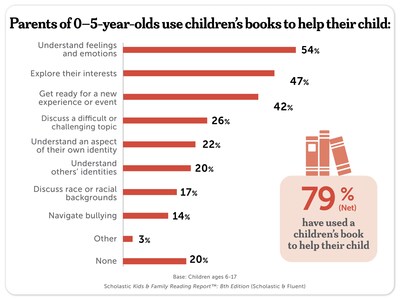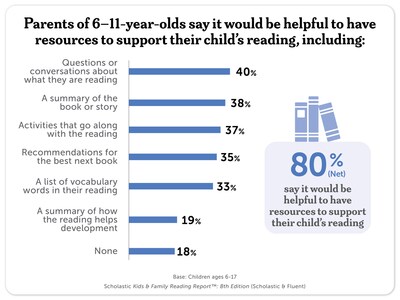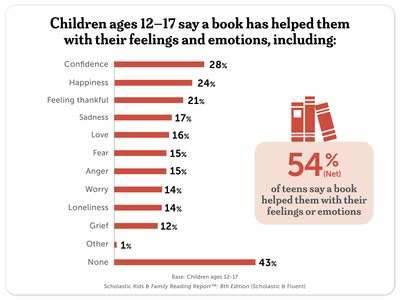Scholastic Kids & Family Reading Report™ Releases New Data to Support Making Books Part of Growing Up for Every Child
Rhea-AI Summary
Scholastic (NASDAQ: SCHL) has released a Family Guide with new data from the Kids & Family Reading Report™: 8th Edition. The guide aims to support families in making books part of every child's upbringing. Key findings include:
- 90% of parents agree books create opportunities for conversation
- 79% of parents with 0-5-year-olds use children's books for parenting
- 51% of preschoolers are read aloud to 5-7 days a week
- 80% of parents with 6-11-year-olds want resources to support reading
- 63% of parents with teens believe it's important for children to read books with relatable characters
The report also highlights the mental health benefits of frequent reading among children. This free resource is particularly relevant amid the current youth mental health crisis.
Positive
- Release of a new Family Guide with data from the Kids & Family Reading Report™: 8th Edition
- 90% of parents agree books create opportunities for conversation with children
- 79% of parents with 0-5-year-olds use children's books for parenting support
- 80% of parents with 6-11-year-olds want resources to support their child's reading
- Frequent readers report better mental health compared to infrequent readers
Negative
- Decline in read-aloud frequency as children age: 51% for 0-5 years, 37% for 6-8 years, and 16% for 9-11 years
- Youth mental health crisis mentioned, indicating potential challenges for the target market
News Market Reaction 1 Alert
On the day this news was published, SCHL declined 2.49%, reflecting a moderate negative market reaction.
Data tracked by StockTitan Argus on the day of publication.
The Family Guide offers a wealth of insights focusing on how books are critical in fostering communication between parent and child across all ages
To learn more about the Scholastic Kids & Family Reading Report and to access the Family Guide, visit www.scholastic.com/readingreport.
"Here at Scholastic, we know that children's books have superpowers, and this new research demonstrates just how invaluable books are for supporting communication with children from birth through adolescence to graduation and beyond," said Deimosa Webber-Bey, Director, Information Services and Cultural Insight, Scholastic. "Books can provide comfort, a portal to faraway places, an introduction to new concepts and a helping hand when broaching tough topics. With this new compilation of research, our hope is that families will feel empowered to incorporate books into all aspects of their parenting efforts, and that books can serve parents in building an everlasting bond with their child."
This free resource holds significant relevancy as our nation's families are grappling with a youth mental health crisis. According to Scholastic research, more frequent readers report having better mental health than infrequent readers, with infrequent readers reporting higher levels of nervousness and anxiety (
Key findings from the Scholastic Kids & Family Reading Report™ Family Guide:
- At every age (0–17)
- An overwhelming majority of parents (
90% ) agree that books can create opportunities for conversation.
- An overwhelming majority of parents (
- The early years (ages 0–5)
- The majority of parents with infants, toddlers and preschoolers 0–5-year-olds (
79% ) have used children's books to support their parenting efforts. - Top ways books have proved to be useful tools include: helping children understand feelings and emotions (
54% ) and helping children explore their interests (47% ). 51% of preschoolers (ages 0–5) are read aloud to at home 5–7 days a week, compared to only37% of 6–8-year-olds and16% of 9–11-year-olds.
- The majority of parents with infants, toddlers and preschoolers 0–5-year-olds (
- Elementary school years (ages 6–11)
- Many parents of elementary-aged children have sought specific books that can help broach discussions about different or new experiences that their child may be facing, including navigating bullying (
20% ) and discussing difficult topics (32% ). - Eighty percent of parents with 6–11-year-olds say it would be helpful to have resources to support their child's reading, such as questions or conversation-starters about what they are reading (
40% ) or a summary of the book or story (38% ).
- Many parents of elementary-aged children have sought specific books that can help broach discussions about different or new experiences that their child may be facing, including navigating bullying (
- Middle and high school years (ages 12–17)
- Two-thirds of parents with teens (
63% ) believe it is important for their child to read books with characters who are similar to them and their experiences. - The majority of parents of teens (
86% ) believe that books can create opportunities for them to have conversations with their child. - Most parents of teens (
69% ) have used a book to help their child with something they are experiencing. - Teens see books as offering opportunities for introspection, with half of teens (
54% ) saying a book has helped them with their feelings, including confidence (28% ), happiness (24% ), and feeling thankful (21% ).
- Two-thirds of parents with teens (
The Scholastic Kids & Family Reading Report is a nationally representative survey sharing the views of both kids and their parents on reading books for fun and the influences that impact kids' reading frequency and attitudes toward reading. This 8th Edition survey was conducted by Fluent Research between December 13, 2022 and January 6, 2023, with a total sample size of 1,724 parents and children including 637 parents with children ages 0–5, 1,087 parents with children ages 6–17, plus one child ages 6–17 from the same household. Parents of children ages 6–17 completed their survey questions first before passing the survey on to one randomly selected child in the target age range. The survey sample was sourced and recruited by Ipsos using their nationally representative KnowledgePanel®.
For more information about Scholastic (NASDAQ: SCHL), visit the Company's media room: http://mediaroom.scholastic.com.
![]() View original content to download multimedia:https://www.prnewswire.com/news-releases/scholastic-kids--family-reading-report-releases-new-data-to-support-making-books-part-of-growing-up-for-every-child-302226470.html
View original content to download multimedia:https://www.prnewswire.com/news-releases/scholastic-kids--family-reading-report-releases-new-data-to-support-making-books-part-of-growing-up-for-every-child-302226470.html
SOURCE Scholastic Inc









